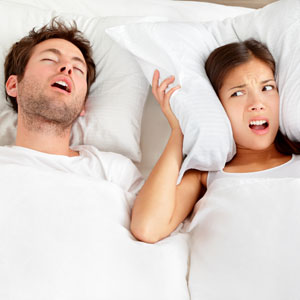Page Contents
What Sleep Apnea Causes?
Just like what the title says, sleep apnea is a sleep problem. However, it’s not just any sleep-related issue — it’s something that can put your life in grave danger! That’s because there are many serious problems that may come into being as a result of sleep apnea. Treating it effectively ASAP is a definite must.
What makes sleep apnea a very serious matter is this: it can cause your blood oxygen levels to drop considerably.
It doesn’t really come as a big surprise since sleep apnea causes you to stop breathing while you’re sleeping. How many times does this sleep condition disrupt your breathing at night? Depends on the severity:
- Mild sleep apnea: less than 15 times every hour
- Moderate sleep apnea: 15 to 29 times every hour
- Severe sleep apnea: 30 or more times every hour
According to sleep specialists, some people with severe sleep apnea stop breathing more than 100 times every hour while they’re taking a trip to dreamland! By the way, it’s not just the severity of sleep apnea as well as the number of pauses in breathing that vary, but also the type of the disorder. There are in fact a few different types of the sleep problems. Of all the types of sleep apnea obstructive sleep apnea (OSA) is what’s considered as the most common. Put simply, this is something that occurs when the throat muscles relax, excessively thus causing a blockage of the airways.
One of the symptoms of sleep apnea is snoring. This doesn’t mean, however, that all people who snore are suffering from sleep apnea. So how do you know if someone who snores may be suffering from sleep apnea? Well, it’s likely to be sleep apnea if there are pauses in breathing during sleep, followed by choking or gasping sounds.
To be sure if your snoring is due to sleep apnea or not, it’s a good idea for you to go to a sleep specialist for a visit without delay for evaluation. This is vital for getting the best treatment plan for your sleep disorder.
Snoring is Not the Only Symptom
 Aside from snoring, there are a few other sleep apnea symptoms. If the person you’re sharing the bed or bedroom with says that you are snoring and you also have some of the following symptoms, there is a huge possibility that you are indeed suffering from sleep apnea:
Aside from snoring, there are a few other sleep apnea symptoms. If the person you’re sharing the bed or bedroom with says that you are snoring and you also have some of the following symptoms, there is a huge possibility that you are indeed suffering from sleep apnea:
- Dry or sore throat. Snoring and pauses in breathing due to sleep apnea can be quite stressful to the throat, and therefore it’s not unlikely for you to wake up with a throat that feels dry or sore.
- Choking sensation. Do you remember waking up in the middle of the night feeling like you’re choking? If this is a nightly occurrence, chances are you have undiagnosed sleep apnea.
- Headaches. The presence of a nagging headache in the morning that lasts for about 30 minutes is quite common among people with sleep apnea. It’s because the brain is being deprived of much-needed oxygen during sleep.
- Lack of energy. Sleep apnea can keep you from getting the recommended 7 to 9 hours of high-quality sleep, and therefore the following day you may feel weak and exhausted like you never had any sleep.
- Excessive daytime sleepiness. Because of failure to get enough restorative sleep, feeling very sleepy all day long is always a possibility, which can be quite dangerous especially when you’re driving or operating a machine.
- Inability to focus. There are many things that can result from not getting sufficient amounts of high-quality sleep at night, and it includes difficulty concentrating. Your memory may suffer as well.
- Mood changes. It’s no secret that a person who didn’t get enough sleep is irritable. That is why it’s likely for some of your family and friends to keep on dodging you if you have sleep apnea in order to avoid conflicts.
Just because you have one or many of the above-mentioned symptoms doesn’t mean that you have sleep apnea. If you suspect that you have it based on some telltale symptoms, what you need to do is head to a sleep clinic for evaluation and potentially a sleep study.
Problems Stemming from the Sleep Disorder
 Earlier in this article, we mentioned that sleep apnea can cause pauses in breathing (up to more than 100 times an hour in some cases!) while you’re taking a trip to dreamland. The problem with breathing cessations brought about by sleep apnea while you’re catching some shut-eye is that it causes your blood oxygen levels to drop.
Earlier in this article, we mentioned that sleep apnea can cause pauses in breathing (up to more than 100 times an hour in some cases!) while you’re taking a trip to dreamland. The problem with breathing cessations brought about by sleep apnea while you’re catching some shut-eye is that it causes your blood oxygen levels to drop.
Oxygen is needed by your organs, and keeping them from getting enough of it could lead to disastrous results. This is exactly why sleep apnea is known to increase your risk of having some serious health concerns.
If truth be told, there are many problems that sleep apnea can cause and one of them is cardiovascular disease. When the levels of blood oxygen drop as a result of sleep apnea, the blood pressure increases to make sure that the various organs will still be supplied with the oxygen they need. However, this is something that can be quite stressful to the heart and arteries. This is why someone with undiagnosed and untreated sleep apnea is likely to end up with heart attack and stroke — we all know that both of them are life-threatening matters!
Other health-related problems that may show up due to sleep apnea are:
- Diabetes. According to health authorities, sleep apnea can cause some issues with the way your body utilizes insulin, which is a hormone that regulates the amounts of sugar in the bloodstream. This is why someone who has sleep apnea has an increased risk of having diabetes sooner or later.
- Obesity. So many people who are dealing with sleep apnea, knowingly or unknowingly, weigh more than they should. So in other words, obesity is a common complication of the sleep disorder. The problem with being obese is that there are various health problems that may stem from it, including heart disease and arthritis.
- Anxiety and depression. Mental health experts say that anxiety and depression are some of the most common forms of mental illness these days. Numerous studies show that sleep apnea can cause anxiety and depression in some. Both forms of mental illness can significantly decrease productivity and quality of life.
The more sleep apnea goes undiagnosed, the greater the risk of developing one or many of the problems stated above. It’s for this reason exactly why visiting a sleep specialist is a definite must.
What Can be Done to Manage the Problem
 Fret not if you believe that you are suffering from sleep apnea. That’s because it is something that is highly treatable, thus keeping you from encountering the various health complications associated with it. When it comes to having the right sleep apnea treatment, approaching a sleep specialist is the step that should be taken.
Fret not if you believe that you are suffering from sleep apnea. That’s because it is something that is highly treatable, thus keeping you from encountering the various health complications associated with it. When it comes to having the right sleep apnea treatment, approaching a sleep specialist is the step that should be taken.
It is through evaluating the individual as well as undergoing a sleep apnea test, in particular what’s called a sleep study, that the sleep disorder can be identified.
Once the presence of sleep apnea is confirmed, the right treatment for it can be then provided. The use of a machine called continuous positive airway pressure (CPAP) is the most common solution available. There are instances in which the use of an oral appliance may be recommended. Surgical solutions for sleep apnea are available, too.
There are also certain steps that you may take in order to deal with sleep apnea. Here are some of those that are proven to yield favorable results:
- Maintain a healthy weight. Earlier, it was discussed that sleep apnea may cause obesity. It’s important to note that being obese can in fact worsen sleep apnea.
- Avoid smoking and alcohol. Most especially if it’s OSA, which is a type of sleep apnea, you’re suffering from, cigarette smoking and alcohol consumption can cause worsening of it — smoking can cause throat irritation and inflammation while alcohol can cause the throat muscles to relax excessively.
- Keep stress levels to a minimum. Something as simple as de-stressing at the end of a long and exhausting day can help to put sleep apnea under control.
- Use the right mattress. Did you know that there are mattresses specifically made for those who have sleep apnea? These products are designed to provide optimum head support, thus keeping the airways open. They are also hypoallergenic in order to fend off allergies that can aggravate sleep apnea.
Sleep apnea is a matter that should not be taken lightly. If you suspect you have it, what you need to do is seek the help of a sleep specialist for evaluation and getting the appropriate treatment plan.




